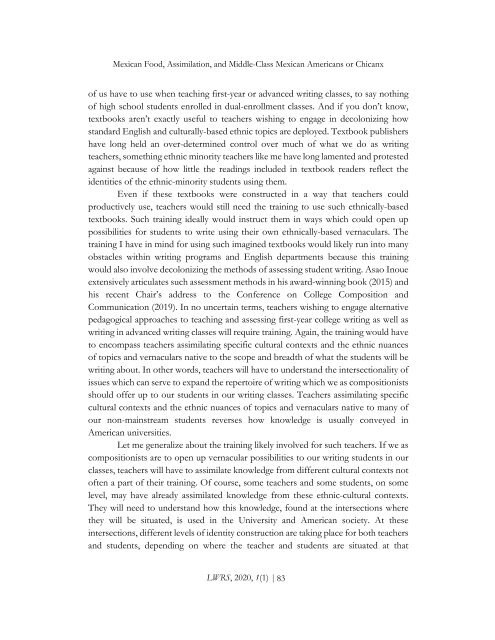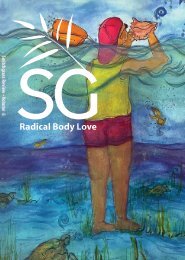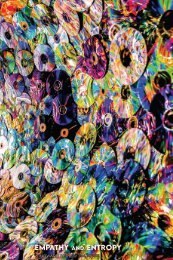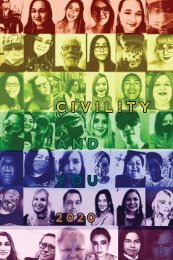LWRS June 2020 Volume 1, Issue 1
Inaugural Issue co-edited by Yndalecio Isaac Hinojosa and Isabel Baca
Inaugural Issue co-edited by Yndalecio Isaac Hinojosa and Isabel Baca
You also want an ePaper? Increase the reach of your titles
YUMPU automatically turns print PDFs into web optimized ePapers that Google loves.
Mexican Food, Assimilation, and Middle-Class Mexican Americans or Chicanx<br />
of us have to use when teaching first-year or advanced writing classes, to say nothing<br />
of high school students enrolled in dual-enrollment classes. And if you don’t know,<br />
textbooks aren’t exactly useful to teachers wishing to engage in decolonizing how<br />
standard English and culturally-based ethnic topics are deployed. Textbook publishers<br />
have long held an over-determined control over much of what we do as writing<br />
teachers, something ethnic minority teachers like me have long lamented and protested<br />
against because of how little the readings included in textbook readers reflect the<br />
identities of the ethnic-minority students using them.<br />
Even if these textbooks were constructed in a way that teachers could<br />
productively use, teachers would still need the training to use such ethnically-based<br />
textbooks. Such training ideally would instruct them in ways which could open up<br />
possibilities for students to write using their own ethnically-based vernaculars. The<br />
training I have in mind for using such imagined textbooks would likely run into many<br />
obstacles within writing programs and English departments because this training<br />
would also involve decolonizing the methods of assessing student writing. Asao Inoue<br />
extensively articulates such assessment methods in his award-winning book (2015) and<br />
his recent Chair’s address to the Conference on College Composition and<br />
Communication (2019). In no uncertain terms, teachers wishing to engage alternative<br />
pedagogical approaches to teaching and assessing first-year college writing as well as<br />
writing in advanced writing classes will require training. Again, the training would have<br />
to encompass teachers assimilating specific cultural contexts and the ethnic nuances<br />
of topics and vernaculars native to the scope and breadth of what the students will be<br />
writing about. In other words, teachers will have to understand the intersectionality of<br />
issues which can serve to expand the repertoire of writing which we as compositionists<br />
should offer up to our students in our writing classes. Teachers assimilating specific<br />
cultural contexts and the ethnic nuances of topics and vernaculars native to many of<br />
our non-mainstream students reverses how knowledge is usually conveyed in<br />
American universities.<br />
Let me generalize about the training likely involved for such teachers. If we as<br />
compositionists are to open up vernacular possibilities to our writing students in our<br />
classes, teachers will have to assimilate knowledge from different cultural contexts not<br />
often a part of their training. Of course, some teachers and some students, on some<br />
level, may have already assimilated knowledge from these ethnic-cultural contexts.<br />
They will need to understand how this knowledge, found at the intersections where<br />
they will be situated, is used in the University and American society. At these<br />
intersections, different levels of identity construction are taking place for both teachers<br />
and students, depending on where the teacher and students are situated at that<br />
<strong>LWRS</strong>, <strong>2020</strong>, 1(1) | 83





